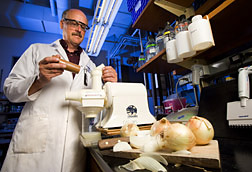This page has been archived and is being provided for reference purposes only. The page is no longer being updated, and therefore, links on the page may be invalid.
Read the magazine story to find out more. |
|
|
Onions with a Nutritional—Not Pungent—Punch
By Erin PeabodyMarch 13, 2007
Wipe away those tears. The onion, famous for causing eyes to water and digestive systems to rumble, is being primed for a makeover.
An Agricultural Research Service (ARS) plant geneticist is trying to bring out the best in onions—their copious heart-healthy compounds, good-for-the-body antioxidants and soluble fiber—while still retaining what consumers love most about the veggie: its sweet, mildly sharp taste.
The scientist, Michael Havey of the ARS Vegetable Crops Research Unit at Madison, Wis., considers onions to be one of the most important health-promoting, or functional, foods. They contain three different groups of health-enhancing compounds: thiosulfinates, fructans and flavonoids.
The thiosulfinates that give onions their pungency are also a great boon to the body's bloodstream. The vegetable world's answer to aspirin, these blood-thinning compounds can bust up platelets that might otherwise form troubling plugs at sites of vascular damage.
Fructans are a source of soluble fiber shown to reduce rates of colorectal cancers. And onions' flavonoids, such as quercetin, show proven antioxidant activity.
But to get optimal amounts of these beneficial compounds, onion lovers need to reach for denser, more pungent varieties. The popular "sweet and mild" onion varieties contain a lot of water, which dilutes their nutrient content.
To help him package all of the onion's desirable taste and nutrient qualities into one bulb, Havey is pinpointing which genes are linked to various healthful nutrients.
He and colleagues have found several genes of importance, including one they recently discovered that helps onions accumulate the fibrous fructans. The more fructans there are, the more heart-healthy thiosulfinates there'll be, too.
Havey has also identified a gene that coordinates the buildup of sucrose in onion bulbs. This means it may be possible to boost the veggie's naturally sweet flavors, while still increasing the compounds that are linked to good health.
Read more about ARS vegetable research in the latest issue of Agricultural Research magazine.
ARS is the chief scientific research agency of the U.S. Department of Agriculture.

